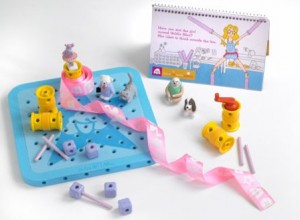 Have you ever noticed that the toy industry perpetuates stereotypes about gender roles? Girls play with dolls and bake cakes. Boys drive, build and compete.
Have you ever noticed that the toy industry perpetuates stereotypes about gender roles? Girls play with dolls and bake cakes. Boys drive, build and compete.
An engineer named Debbie Sterling is doing her part to “bust” that stereotype with GoldieBlox , a construction toy and book series starring Goldie, the kid inventor who loves to build. Targeted towards girls ages 5-9, as girls read along, they get to build what Goldie builds, which includes a parade float vehicle, a belt drive and a pulley elevator.
Sterling spent a year doing in-depth research into gender differences and child development to create the concept. She learned that boys have strong spatial skills, which is why they prefer construction-type toys. Girls, who have better verbal skills like reading, stories and characters. GoldieBlox brings the two together…reading and building.
While there has been some critical press about GoldieBlox as not really holding children’s interest, for the most part, those who have reviewed the product think it is a step in the right direction in making it fun and okay for girls to build things.
Even if GoldieBlox is not the end and be all, it will likely inspire other toy makers to take a look at gender specific toys and perhaps recognize the need to rethink their product development and marketing strategies.
It is clear society still socializes girls to be non-aggressive, “pretty in pink”, prepared to care for the home and boys are taught to be tough, “mechanically oriented” , protectors and bread winners.
We do have to start at an early age to give girls and boys different options for what pursuits and interests are deemed “acceptable”. It has to be just as ok for boys to play with dolls and girls to shun dolls for erector sets. If we don’t start socializing our children differently, young women will still find it hard to penetrate the “man’s world” of engineering. According to a study reported in Harvard Business review (Stopping the Exodus of Women in Science), even when women do go into engineering careers, over half drop out by the time they are in their mid-30s, with the primary reasons including hostile work environment and isolation of being the only woman.
I applaud Debbie Sterling for her efforts in innovating a great inclusion solution!


















